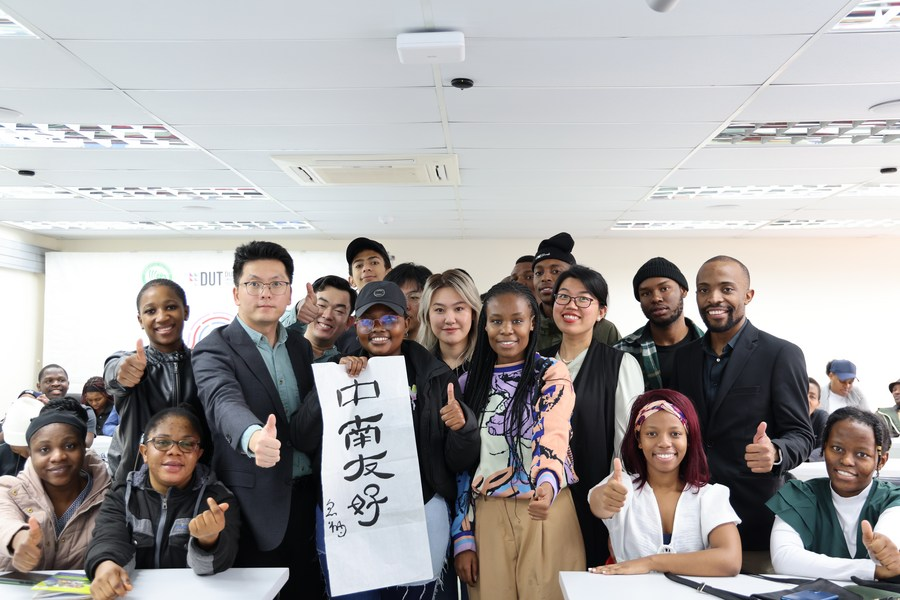
Africa is expecting deepened exchanges and cooperation with China as the latter advances toward modernization, a progress that will continue to benefit not only Africa but also the entire world, said African experts and entrepreneurs following a key meeting recently held in China.
Hope Papo, deputy spokesman of South Africa's African National Congress party, congratulated the Communist Party of China on the successful third plenary session of the 20th CPC Central Committee.
He said the outcomes of this session indicate a strengthening of China-South Africa cooperation across various sectors, including infrastructure development, technological advancement and economic growth.
READ MORE: Strengthened China-Africa ties urged ahead of summit
"The plenum's decisions are important for China and the world. We have been telling people that you can't ignore China. We see China and South Africa deepening relations, bringing tangible benefits to our citizens. We welcome China's commitment to peace and security, building prosperity without violence," Papo said.
Charles Onunaiju, director of the Centre for China Studies in Abuja, Nigeria, said the plenary session, which concluded last month, reaffirmed that China will seek peaceful development and common prosperity for all countries during its modernization drive, which brings benefits to the whole world.
"It reiterated that the modernization China pursues is peaceful development and that in foreign relations, the country would continue to be firm in its commitment to an independent foreign policy of peace and ... to promoting a human community with a shared future," Onunaiju said.
China would further integrate and give concrete expression to shared values of mankind in its pursuit of the Global Development Initiative, Global Security Initiative and Global Civilization Initiative, he said, highlighting China's dedication to fostering an equal, multipolar world and promoting universally beneficial and inclusive economic globalization.
READ MORE: Sino-African ties to get boost
Onunaiju also applauded the CPC's people-centered approach in pursuing modernization, which will ensure it success.
"Most emerging economies have had their growth trajectories vitiated by the growth of special and vested interests and ended up in the so-called middle-income trap, which China has avoided, with the CPC having neither interest of its own nor of any special interest group, but the broadest interest of the vast majority of the Chinese people," he said.
David Monyae, director of the Centre for Africa-China Studies at the University of Johannesburg, highlighted the enduring ties between Africa and China, dating back to precolonial times. Even when China was still poor decades ago, it helped Africa's development, he said, citing projects such as the Tanzania-Zambia Railway, where Chinese workers made significant sacrifices.
READ MORE: Bridging the digital divide within BRICS
He said African countries should engage with China, learn from its poverty alleviation efforts that lifted more than 800 million out of absolute poverty, and apply suitable lessons for their own development strategies. The emphasis on cooperation among countries at the Third Plenary Session is a positive signal for both Africa and the whole world, he said.
Supporting globalization
"China says let's work together, in support of globalization; they are also people-centered," he said. "China is embarking on a long march for development and modernization. The Third Plenary Session is a call for Africa to work with China to ensure that when China develops, we also develop. China is confronting reform and contributing to the building of the new international order in a peaceful way."
Julius Thairu, chief commercial and customer officer of Kenya Airways, commended China's efforts to promote international cooperation through the Belt and Road Initiative, which has helped to enhance connectivity, economic cooperation and cultural exchanges between China and Africa.
"By improving air connectivity, we unlock tremendous potential for increased trade, tourism and investment, benefiting industries across both regions," he said. "Moreover, the promotion of cultural exchange through easier travel fosters deeper understanding and stronger people-to-people connections, which are crucial for sustained collaboration."
Ndumiso Mlilo is a freelance journalist for China Daily.


